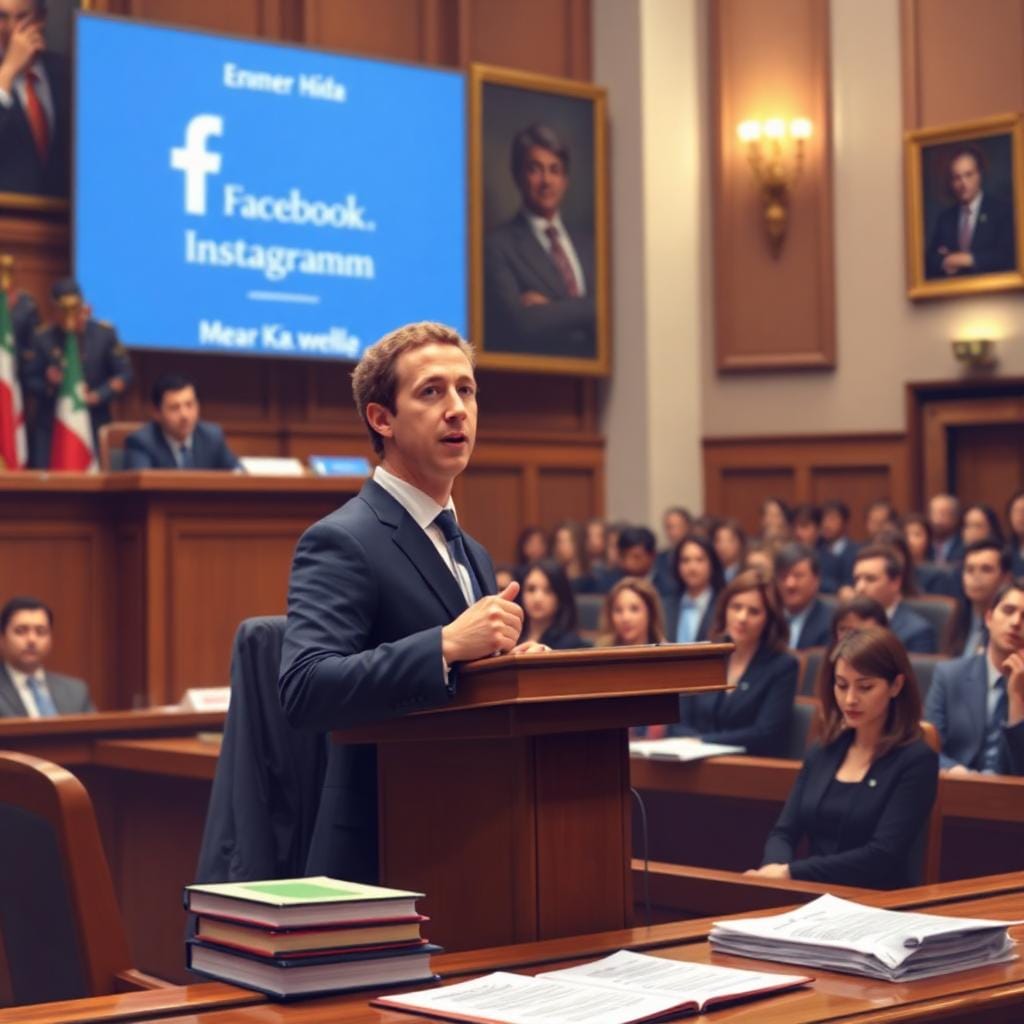
By Elke Porter | WBN News Global | April 17, 2025
In a courtroom drama that has gripped the nation, Mark Zuckerberg, the co-founder and CEO of Meta Platforms, Inc. (formerly Facebook), faces a historic trial over allegations of monopolistic behavior. Launched in 2020 by a coalition of 46 state attorneys general, the Federal Trade Commission (FTC), and the Department of Justice, the case accuses Meta of illegally maintaining a stranglehold on the social media and digital advertising markets. As of April 2025, the trial has reached a fever pitch, with global implications for the tech industry hanging in the balance.
The accusations center on Meta’s alleged anti-competitive practices, which prosecutors claim have suffocated innovation and consumer choice. At the heart of the case are Meta’s blockbuster acquisitions of Instagram in 2012 for $1 billion and WhatsApp in 2014 for $19 billion. The FTC argues these deals were not mere business expansions but calculated moves to neutralize emerging competitors before they could challenge Meta’s dominance.
“Facebook didn’t out-innovate its rivals—it bought them,” said FTC Chair Lina Khan in a 2023 statement, a sentiment echoed repeatedly in court. Prosecutors point to internal Meta emails, including a 2012 message from Zuckerberg himself, describing Instagram as a “threat” that needed to be acquired or “neutralized.
”The trial has also spotlighted Meta’s dominance in digital advertising, a market where it controls roughly 24% of global ad revenue, trailing only Google. Evidence presented in court alleges that Meta leverages its vast trove of user data—collected from over 3 billion monthly active users across its platforms—to create hyper-targeted advertising tools that smaller competitors cannot replicate. This, prosecutors argue, creates a feedback loop that entrenches Meta’s market power while stifling nascent platforms like TikTok or decentralized social networks.
Privacy concerns have loomed large in the proceedings. Whistleblowers, including former Meta data scientists, have testified about the company’s internal mantra of “growth at all costs,” alleging that user data was weaponized to maintain market supremacy rather than prioritize user safety. A particularly damning revelation came from leaked documents showing Meta’s algorithm tweaks in 2018, which allegedly favored divisive content to boost engagement, raising questions about the societal cost of its monopoly.
Zuckerberg, taking the stand in a rare public appearance, has defended Meta’s practices with characteristic resolve. Clad in a tailored suit—a departure from his signature hoodie—he argued that Meta’s acquisitions were visionary bets that benefited consumers. “Instagram and WhatsApp are what they are today because of our investment and innovation,” he told the court, citing features like Stories and end-to-end encryption as proof of Meta’s commitment to users. He also emphasized that Meta’s services remain free, connecting billions in an increasingly digital world. Yet, his testimony was met with skepticism from prosecutors, who pressed him on why Meta repeatedly cut off API access to competing apps, effectively kneecapping their growth.
The trial’s stakes extend far beyond Meta’s fate. It has ignited a broader reckoning about the unchecked power of Big Tech, with parallels to landmark antitrust cases like United States v. Microsoft in the 1990s. Legal experts suggest the outcome could lead to sweeping remedies, from forcing Meta to divest Instagram and WhatsApp to imposing strict regulations on data usage across the tech sector. Public sentiment, as seen in X posts, is deeply divided: some users hail Zuckerberg as a tech pioneer, while others decry Meta as a “digital overlord” that shapes discourse and democracy itself.
As closing arguments approach, the trial’s outcome remains uncertain. A ruling against Meta could reshape the tech landscape, emboldening regulators to target other giants like Amazon and Google. Conversely, a victory for Zuckerberg might solidify the status quo, leaving smaller innovators at the mercy of tech titans. Whatever the verdict, the trial of Mark Zuckerberg has already etched itself into history as a pivotal moment in the fight to define the future of the digital age.
#Zuckerberg Trial #Meta Monopoly #Big Tech Antitrust #Social Media Power #Tech Regulations #Digital Dominance #WBN News Global #Elke Porter
Connect with Elke at Westcoast German Media or on LinkedIn: Elke Porter or contact her on WhatsApp: +1 604 828 8788

